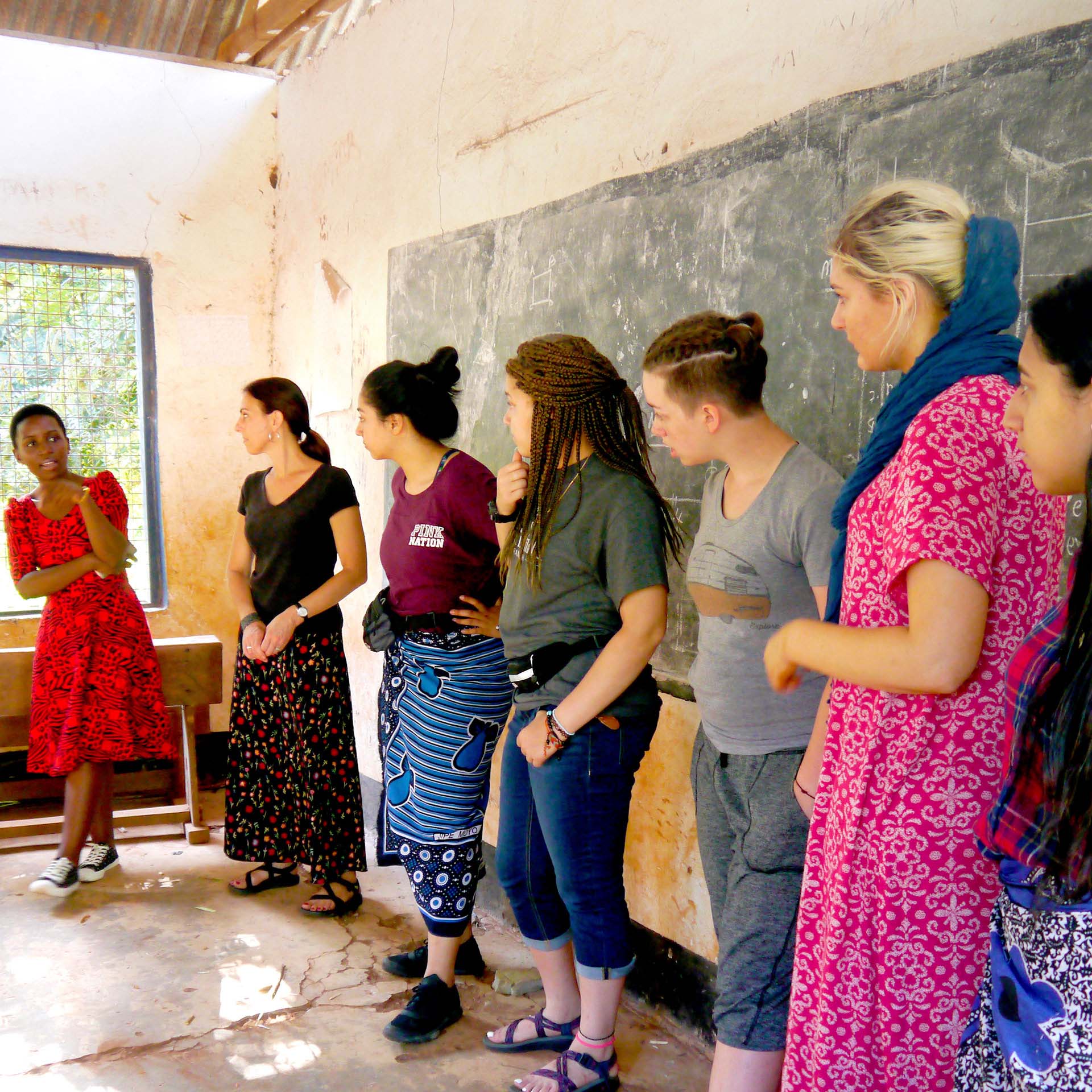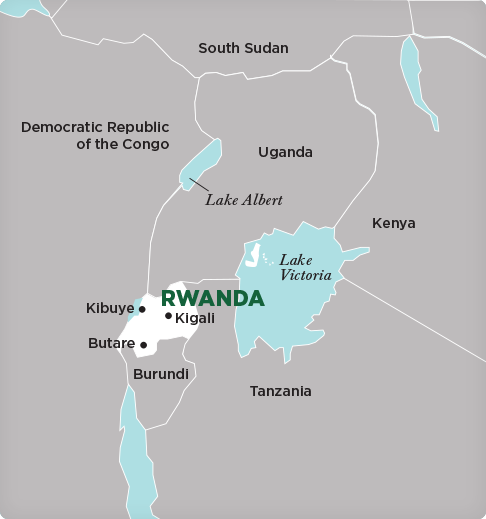Credits
16
Prerequisites
None
Language of Study
Kinyarwanda
Courses taught in
English
Dates
Feb 3 – May 18
Program Countries
Rwanda
Program Base
Kigali
Critical Global Issue of Study
Peace & Justice
Identity & Human Resilience

Examine the 1994 genocide against the Tutsis in Rwanda and efforts to foster peace, unity, and reconciliation.
16
None
Kinyarwanda
English
Feb 3 – May 18
Rwanda
Kigali
Peace & Justice
Identity & Human Resilience
In 1994, Rwanda was the site of a devastating genocide in which more than 1 million people were killed by their neighbors in 100 days. Today, Rwanda provides an excellent case study on reconciliation and peacebuilding. In Kigali, the sprawling capital city, you will study the root causes and impacts of the genocide. You will visit genocide memorials and other places of historical significance to learn about the preservation of the memory of genocide. Different in-country excursions will take you to rural areas where you will have direct interactions with genocide survivors, perpetrators, and rescuers and learn about individual and community healing programs through mechanisms of transitional justice. You will also learn about the economic recovery process and the country’s current efforts towards sustainable peace and development.
None. However, emotional maturity is necessary, as studying genocide and its aftermath may be difficult and upsetting. Knowledge of French is not required but students with a background in the language will have opportunities to use it on the program.


Visit memorials and key sites of the 1994 genocide against the Tutsis. Excursions include the Murambi Genocide Memorial, a technical school where more than 50,000 Tutsi were killed, and the Gisozi Genocide Memorial and Information Center’s mass grave, peace garden, and comprehensive exhibit on the Rwandan genocide. You will also visit the Campaign Against Genocide Museum that documents all steps that were taken to stop the genocide against the Tutsis. You will have opportunities to interact with genocide perpetrators who have completed their sentence and reintegrated back into the community, genocide survivors and their offspring to discuss achievements as well as challenges in relation to reconciliation.
Please note that SIT will make every effort to maintain its programs as described. To respond to emergent situations, however, SIT may have to change or cancel programs.
Upon successful completion of the program, students will be able to:
The following syllabi are representative of this program. Because courses develop and change over time to take advantage of dynamic learning opportunities, actual course content will vary from term to term.
The syllabi can be useful for students, faculty, and study abroad offices in assessing credit transfer. Read more about credit transfer.
Anatomy of Genocide and Intra-State Conflict – syllabus
(AFRS3000 / 3 credits)
This course lays the foundation for the entire semester’s learning process by exploring the history that precipitated the genocide in Rwanda. Genocide and conflicts in general are construed as phenomena of political institutions of the modern era, and studying contemporary genocide, in part, casts a lens on modernity’s institutions and practices. And yet popular discourse associates conflict in African settings with the incompetence of African institutions and inability of various ethnicities to foster peaceful co-existence or as primordial ethnic conflict. Using the Rwandan genocide as case study, the course casts a critical lens upon the political institutions of the modern world, and critiques popular reductionist explanations that regard conflicts in Africa as driven simply by primordial ethnic tensions.
Post-Conflict Reconstruction and Peacebuilding – syllabus
(PEAC3000 / 3 credits)
Rwanda presents an excellent setting in which to examine the various measures, strategies, programs, and projects that have been put in place by the government of Rwanda, western organizations, NGOs, and communities to mitigate the impact of conflict and to rebuild, reconstruct, and revive fractured relations and displaced communities. What choices for reconciliation, reconstruction, and development have been made in Rwanda? What theoretical underpinnings shape these choices, and what are the implications of these choices for sustainable peace and development?
Drawing on the contemporary theories of peacebuilding and related processes, the course provides a platform for critical analysis of not only the challenges but also the opportunities related to post-genocide reconstruction, and the pursuit of positive peace in Rwanda. Carefully selected visits to NGOs, government agencies, and to urban as well as rural communities in Rwanda are complemented by lectures by Rwandan experts and selected reading assignments. An excursion to the southwestern part of Rwanda enables students to critically focus on the prospects for sustainable development and peace in Rwanda.
Kinyarwanda – syllabus
(KINY1003 / 3 credits)
The role of Kinyarwanda language training is to provide students with basic tools needed for entry into Rwandan culture. The language training is organized and carried out by a language instructor experienced in teaching Kinyarwanda to non-native speakers. Language study consists of 45 hours of formal instruction including experiential sessions on shopping, eating out, and Rwandan cooking and music. Language study is reinforced through the homestay experience and through interactive assignments. Language study also focuses on training students in post-genocide cross-cultural communication nuances, which further facilitates their ability to conduct field research or do an internship with a local NGO.
Research Methods and Ethics – syllabus
(ANTH3500 / 3 credits)
A qualitative research design course designed to provide an overview of methodological field study approaches within the local cultural context, affording students the tools necessary to conduct field research in Rwanda. The course has three main objectives. First, the course introduces students to the tools and methods of field study with a focus on how to do field research with victims of genocide and their descendants or violence perpetrators. In doing so, the course addresses the social and cultural dynamics in post-genocide Rwanda. Classes analyze institutional and cultural strategies used to prevent ethnic conflict and interrogate the role of the field researcher in a post-conflict environment. Second, the course details the ethics of field research and introduces students to the Human Subjects Review process. Third, the seminar devotes time to psychological orientation before site visits and to the processing of field experiences. Given the emotional weight of the program and the impact it may have on students, the program has weekly sessions to debrief, process, and talk about assigned readings, field visits, or testimonies of survivors of genocide. One function of these sessions is to reorient student focus toward positive examples of bravery, caring, and compassion that studies of genocide often reveal.
In addition to taking the above courses, students will also need to enroll in one of the following two courses:
Independent Study Project
Independent Study Project – syllabus
(ISPR3000 / 4 credits)
Conducted in Rwanda in an approved location appropriate to the project. Sample topic areas are:
Browse this program’s Independent Study Projects / undergraduate research.
OR
Internship and Seminar
Internship and Seminar – syllabus
(ITRN3000 / 4 credits)
You will gain valuable work experience and enhance your professional skill set in an international work environment, drawing on the wide network of community organizations, activists, entrepreneurs, business leaders, and academics connected to the program.
Sample internships include:


Alumni of this program are currently working as:
peace and human rights activists in their schools, communities, and organizations.
researchers in the fields of peace, justice, and development.
fields related to peace and conflict, conducting further studies at master’s and PhD levels.


SIT Study Abroad is committed to ensuring that international education is within reach for all students. We believe in the transformative power of immersive, intercultural experiences and are dedicated to supporting students in their educational journey.
See Full Breakdown
A critical step in preparing for your study abroad program is planning how you will maintain your health and wellbeing. Please review the following information carefully and contact [email protected] with any questions or concerns.
View Information
The University of Notre Dame’s Human Development Conference is an annual, student-led conference that provides a platform for dialogue in which students from all different backgrounds and disciplines can share their development-focused research.